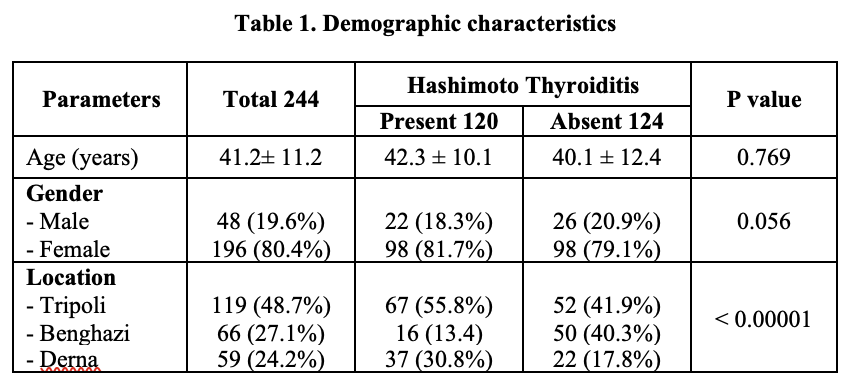
The Journal of Medical Research and Innovation published a new paper titled “Incidence of Hashimoto Thyroiditis Among Libyans: A Retrospective Epidemiological Study”. The abstract is as followed:
Background and aims: Hashimoto’s disease is an autoimmune disorder in which the body produces antibodies that attack the thyroid gland, leading to chronic inflammation, destruction of the gland, and hypothyroidism. This study aimed to assess the epidemiology of this disease among Libyan patients.
Methods: A cross-sectional retrospective study conducted from June 2012 to April 2020 in order to examine the anti TPO level among Libyan population. Data was collected from eastern and western part of Libya, and were analyzed from available sample for 244 apparently patients with thyroid disorders collected from different private clinic’s laboratories. The analysis for serum anti-TPO was done by electrochemiluminescence protein binding assay (ECLIA) using Roche diagnostics and Cobas e411 analyzer.
Results: The current results showed that females predominate the study, and most of them were in the age group of (>40) years old. About 49.18% of these cases were suffering from Hashimoto’s disease (High ATPO level). The mean value of anti-TPO status among females was (0.5±2) nmol/L, while among males it was (0.45±3) nmol/L. Significantly, more women (81.66%) had Anti- TPO Above (34 IU/ml), compared to (18.33%) of male participants.
Conclusion: Hashimoto disease is common among patients with thyroid dysfunction especially females. Our findings suggest that different interventional strategies are needed to reduce the chances of developing Hashimoto’s and its associated negative health outcomes in Libya.
To read full article click here.
